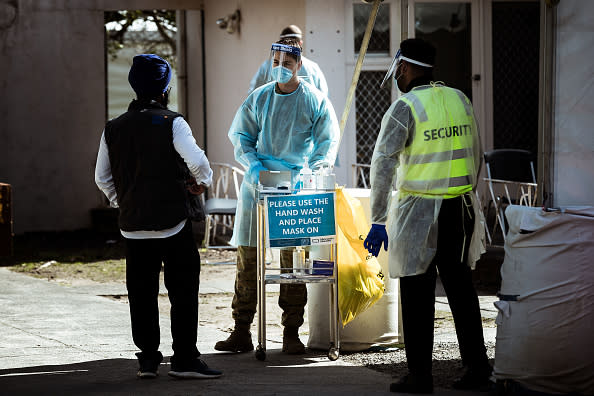Coronavirus Melbourne: Family's disturbing act 'sparked outbreak'
A family of four believed to be responsible for 90 percent of Victoria’s COVID-19 cases spread human waste while in hotel quarantine, an inquiry has heard.
Department of Health and Human Services epidemiologist Charles Alpren has confirmed the state's deadly second wave is attributable to outbreaks at the Rydges on Swanston and Stamford Plaza hotels.
"Approximately 99 per cent of current cases of COVID-19 in Victoria have arisen from Rydges or Stamford," Dr Alpren told the state's hotel quarantine inquiry on Tuesday.
"However, I cannot be very precise in the number or proportion to have arisen from each outbreak separately.
"It is likely that the large majority - I said in my statement approximately 90 per cent or more - of COVID-19 infections in Victoria can be traced to the Rydges Hotel."

Dr Alpren said the Rydges outbreak started with a family of four returned from overseas on May 9 and went into hotel quarantine where they developed symptoms over the next few days.
They were moved to the Rydges on May 15 when they were all displaying symptoms.
By May 18, all four had tested positive.
‘Episode of environmental contamination’ sparks outbreak
He added in a witness statement that on May 18 there was an “episode of environmental contamination", thought to be human waste.
It’s thought the kids spread the human waste through the room, News Corp reported.
It “required assistance from nursing staff to rectify”, Dr Alpren wrote.
A week later, a hotel staff member and two security guards were diagnosed with COVID-19. It is not clear who was the first of the three to contract the virus.
By mid-June, a total of 17 workers at the hotel and their close contacts had tested positive.

Dr Alpren added in his witness statement the family was "approved to walk outside their room, during which time they were accompanied by security guards".
But no cases have been identified from either of the events - the contamination or walking outside the room, Dr Alpren said.
"Transmission could have occurred directly from the family to staff or through contamination with virus on surfaces in the hotel with which staff then had contact with," his statement reads.
At the time of the Rydges outbreak, there were very few other cases of COVID-19 in Victoria and just 19 people had died from the virus.

The state's death toll now stands at 351, with 7274 cases active.
Second outbreak traced back to traveller
Another outbreak also emerged at the Stamford Plaza, which was traced back to a man who returned from overseas on June 1 and a couple who returned on June 11.
A worker at the Stamford Plaza was the first to show symptoms on June 10 and tested positive on June 14.
Some 46 workers at the hotel and their close contacts were found to have caught COVID-19.
Dr Alpren found "no links" between cases at the Rydges and cases at the Stamford Plaza.
Having analysed the genomic sequencing of 5395 active cases, Dr Alpren said 3594 could be linked to the Rydges hotel.
The outbreak is also linked to another 24 clusters.

Dr Alpren said the department has seen "no evidence of any other transmission" outside the hotels, excluding three exceptions.
"That's not to say that there are no other transmission events that could be there. But because there are very few people now coming into Victoria who potentially offer new sources of importation of the virus, it is less and less likely," he said.
Inappropriate PPE given to security guards at hotels
It comes after an expert on Monday described advice on personal protective equipment given to security staff at the hotels as inappropriate and inaccurate.
Infectious disease expert Professor Lindsay Grayson said security guards should have been wearing eye protection, gloves, a gown and mask when interacting with returned travellers or handling objects belonging to them.
The inquiry continues on Thursday with hotel guests and workers expected to give evidence.
with AAP
Do you have a story tip? Email: newsroomau@yahoonews.com.
You can also follow us on Facebook, Instagram and Twitter and download the Yahoo News app from the App Store or Google Play.



